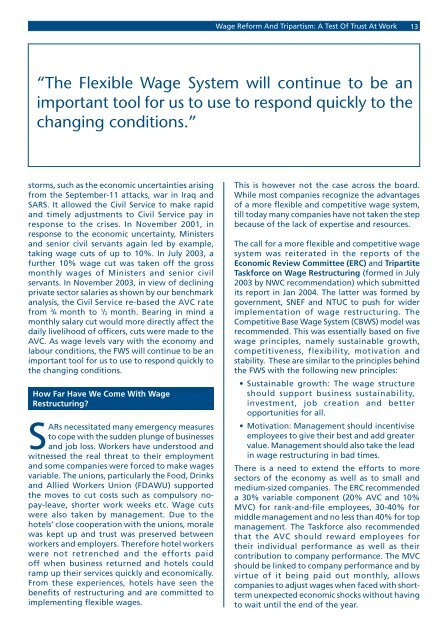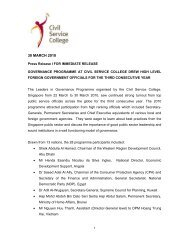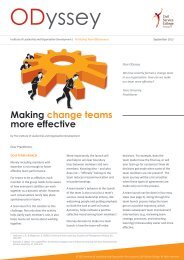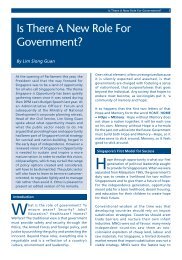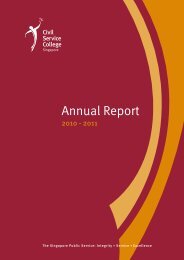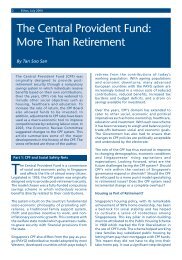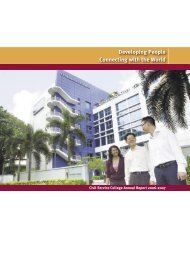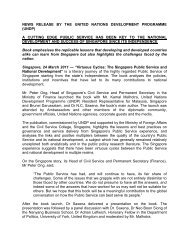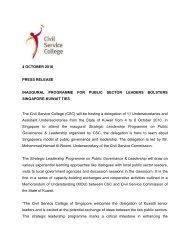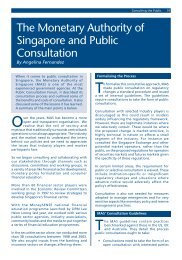Wage Reform & Tripartism : A Test of Trust At Work - Civil Service ...
Wage Reform & Tripartism : A Test of Trust At Work - Civil Service ...
Wage Reform & Tripartism : A Test of Trust At Work - Civil Service ...
Create successful ePaper yourself
Turn your PDF publications into a flip-book with our unique Google optimized e-Paper software.
<strong>Wage</strong> <strong>Reform</strong> And <strong>Tripartism</strong>: A <strong>Test</strong> Of <strong>Trust</strong> <strong>At</strong> <strong>Work</strong>13“The Flexible <strong>Wage</strong> System will continue to be animportant tool for us to use to respond quickly to thechanging conditions.”storms, such as the economic uncertainties arisingfrom the September-11 attacks, war in Iraq andSARS. It allowed the <strong>Civil</strong> <strong>Service</strong> to make rapidand timely adjustments to <strong>Civil</strong> <strong>Service</strong> pay inresponse to the crises. In November 2001, inresponse to the economic uncertainty, Ministersand senior civil servants again led by example,taking wage cuts <strong>of</strong> up to 10%. In July 2003, afurther 10% wage cut was taken <strong>of</strong>f the grossmonthly wages <strong>of</strong> Ministers and senior civilservants. In November 2003, in view <strong>of</strong> decliningprivate sector salaries as shown by our benchmarkanalysis, the <strong>Civil</strong> <strong>Service</strong> re-based the AVC ratefrom 3 /4 month to 1 /2 month. Bearing in mind amonthly salary cut would more directly affect thedaily livelihood <strong>of</strong> <strong>of</strong>ficers, cuts were made to theAVC. As wage levels vary with the economy andlabour conditions, the FWS will continue to be animportant tool for us to use to respond quickly tothe changing conditions.How Far Have We Come With <strong>Wage</strong>Restructuring?SARs necessitated many emergency measuresto cope with the sudden plunge <strong>of</strong> businessesand job loss. <strong>Work</strong>ers have understood andwitnessed the real threat to their employmentand some companies were forced to make wagesvariable. The unions, particularly the Food, Drinksand Allied <strong>Work</strong>ers Union (FDAWU) supportedthe moves to cut costs such as compulsory nopay-leave,shorter work weeks etc. <strong>Wage</strong> cutswere also taken by management. Due to thehotels’ close cooperation with the unions, moralewas kept up and trust was preserved betweenworkers and employers. Therefore hotel workerswere not retrenched and the efforts paid<strong>of</strong>f when business returned and hotels couldramp up their services quickly and economically.From these experiences, hotels have seen thebenefits <strong>of</strong> restructuring and are committed toimplementing flexible wages.This is however not the case across the board.While most companies recognize the advantages<strong>of</strong> a more flexible and competitive wage system,till today many companies have not taken the stepbecause <strong>of</strong> the lack <strong>of</strong> expertise and resources.The call for a more flexible and competitive wagesystem was reiterated in the reports <strong>of</strong> theEconomic Review Committee (ERC) and TripartiteTaskforce on <strong>Wage</strong> Restructuring (formed in July2003 by NWC recommendation) which submittedits report in Jan 2004. The latter was formed bygovernment, SNEF and NTUC to push for widerimplementation <strong>of</strong> wage restructuring. TheCompetitive Base <strong>Wage</strong> System (CBWS) model wasrecommended. This was essentially based on fivewage principles, namely sustainable growth,competitiveness, flexibility, motivation andstability. These are similar to the principles behindthe FWS with the following new principles:• Sustainable growth: The wage structureshould support business sustainability,investment, job creation and betteropportunities for all.• Motivation: Management should incentiviseemployees to give their best and add greatervalue. Management should also take the leadin wage restructuring in bad times.There is a need to extend the efforts to moresectors <strong>of</strong> the economy as well as to small andmedium-sized companies. The ERC recommendeda 30% variable component (20% AVC and 10%MVC) for rank-and-file employees, 30-40% formiddle management and no less than 40% for topmanagement. The Taskforce also recommendedthat the AVC should reward employees fortheir individual performance as well as theircontribution to company performance. The MVCshould be linked to company performance and byvirtue <strong>of</strong> it being paid out monthly, allowscompanies to adjust wages when faced with shorttermunexpected economic shocks without havingto wait until the end <strong>of</strong> the year.


